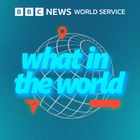
What in the World
Sep 26, 2024
An indigenous red-feather cloak was recently returned to Brazil from a museum in Denmark - where it had been on display for hundreds of years. There are other examples of historic and precious artefacts being returned to their countries of origin. And this is leading to a growing pressure to return more, like the Hoa Hakananai'a, originally taken from Rapa Nui (Easter Island).
The BBC’s Zeinab Dabaa in Cairo talks us through Egypt’s calls for the repatriation of three items: Queen Nefertiti’s bust, the Rosetta Stone and the Dendara Zodiac. Ashley Lime, a BBC journalist in Nairobi, explains the significance of the Benin Bronzes - and why some museums are reluctant to let them go.
Alongside the campaigns to get valuable and historic items returned, there are also efforts to digitise treasures. Chidi Nwaubani is the founder of Looty, a radical art collective which wants to use augmented reality to create digital versions of artefacts and, in their words, “loot back” treasures. He was speaking to BBC Click.
Instagram: @bbcwhatintheworld Email: [email protected] WhatsApp: +44 0330 12 33 22 6 Presenter: Hannah Gelbart Producers: Julia Ross-Roy and Mora Morrison Editor: Emily Horler

